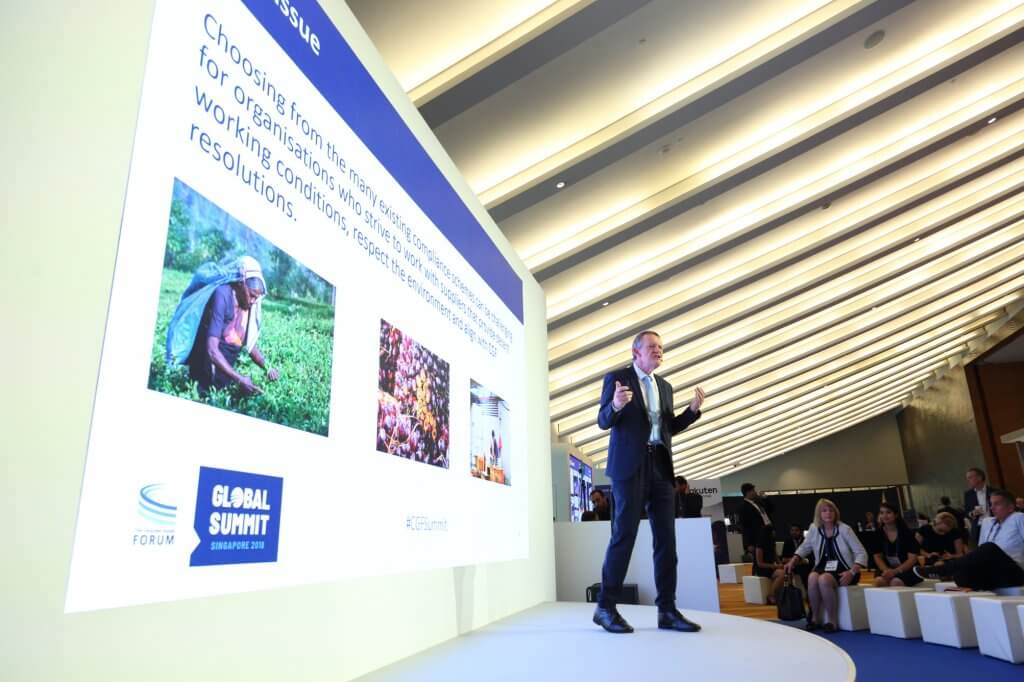Prioritising sustainability has never been more important. With more people involved in forced labour than at any time in history, and with land area the size of New Zealand being deforested in 2016, business and governments face a clear call to action. On our side, as a business and Board member company of The Consumer Goods Forum (CGF), we here at Nestlé understand our shared responsibility to ensure we are contributing to sustainable initiatives. The private sector has a vital role to play, and we want to be a driving force behind the positive actions taking place through collaborative platforms like the CGF.
The CGF recently announced the creation of the Sustainable Supply Chain Initiative (SSCI), which aims to support companies looking to embrace sustainable practices by recognising credible third party standards. As Co-Chair of this initiative, I’m very excited to see how we can improve the processes in place to ensure greater trust in our supply chains. I was also excited to talk about the new initiative during the recent Global Summit in Singapore, where I was able to address CEOs and C-level executives on how SSCI will help make responsible sourcing easier for the industry. Feedback has been overwhelmingly positive, showing the clear need for guidance to navigate the many different standards companies can use to assure compliance in their supply chains.
Driving social compliance
The SSCI will initially focus on all elements of social compliance, including forced labour, child labour, working hours and discrimination. Yet, with FMCG supply chains being so vast and complex, assuring that human and labour rights are met across supply chains is a challenge for companies. What’s worse, businesses are often confronted with a confusing range of technical standards and auditing approaches.
Hence, to break through the noise, the SSCI will provide buyers and suppliers with clear guidance on which third-party auditing and certification schemes cover key sustainability requirements and apply robust verification practices. By undergoing benchmarking and achieving SSCI recognition, scheme owners signal a strong commitment to raising the bar while also driving harmonisation. SSCI will also support companies who wish to align with the CGF’s Resolution on Forced Labour and Priority Industry Principles.
However, it is important to stress that the SSCI is not prescriptive when it comes to adopting third-party schemes: its purpose is not to define FMCG companies’ strategies for them, but to support companies who have chosen third party standards to ensure their supply chains are meeting the sustainability expectations of both consumers and investors. And, while the SSCI will focus on social compliance to begin with, the initiative will become even broader in scope in the future, extending to environmental sustainability.
Setting the bar for everyone
The SSCI has been established with three core objectives, all of which are vital in creating a more sustainable FMCG sector:
- The initiative will aim to assist corporate leaders in selecting credible sustainability schemes. At present, decision-makers can find themselves going through a vast number of different auditing standards without necessarily knowing which are most likely to be effective, and so the SSCI will seek to address this by providing CGF recognition to those that meet the SSCI benchmarking requirements.
- The initiative will aim to enhance efficiency for suppliers and buyers by reducing audit duplication through providing a list of CGF-recognised schemes.
- The programme will seek to drive an improvement in sustainability standards on a wide variety of topics, such as child labour, discrimination and exploitative labour practices as well as robust assurance processes.
The continuing importance of collaboration
The SSCI recognises that collaboration will be crucial in tackling social and, as the project develops, environmental sustainability problems. The challenges we face are so complex that they require the private sector, governments, NGOs and the investor community to come together and drive positive outcomes.
As we enter the public consultation phase, it’s important the approval of the SSCI benchmarking documents involves multiple stakeholders from different backgrounds, ensuring that all parties are able to share their thoughts and expertise. I know that everyone at Nestlé is looking forward to contributing to these discussions and supporting the wider industry in promoting sustainability within organisations.
Like it is the case for the GFSI benchmarking and recognition process, corporations will be able to access a list of recognised third-party schemes. This will be a critical step in building a more sustainable future for FMCG supply chains and in ensuring trust worldwide.
To discover more about the Sustainable Supply Chain Initiative, make sure you check out its dedicated webpage, which can be found here. And if you’re interested in finding more about Nestlé, I invite you to visit our sustainability webpage here.
This post was written and contributed by:
Chris Tyas
Global Head Supply Chain, Nestlé SA


